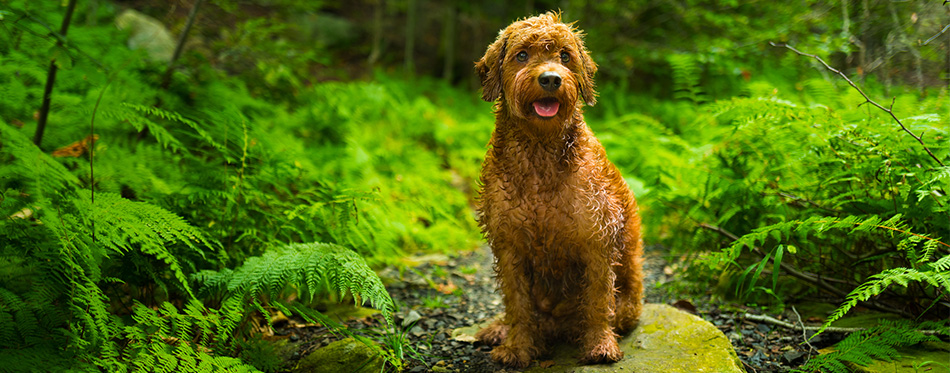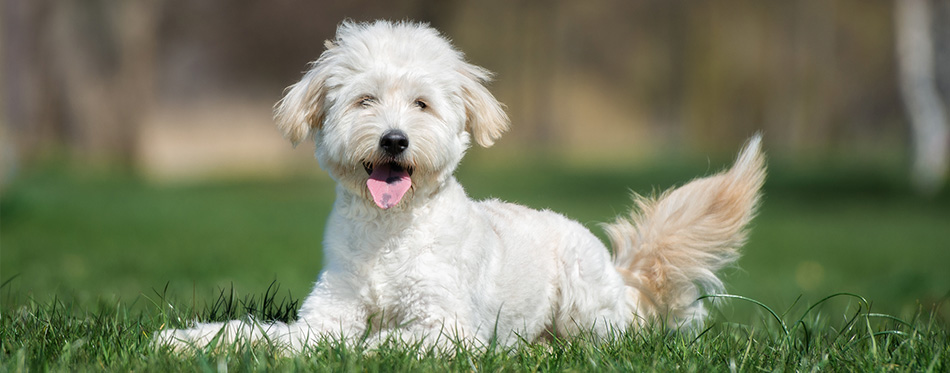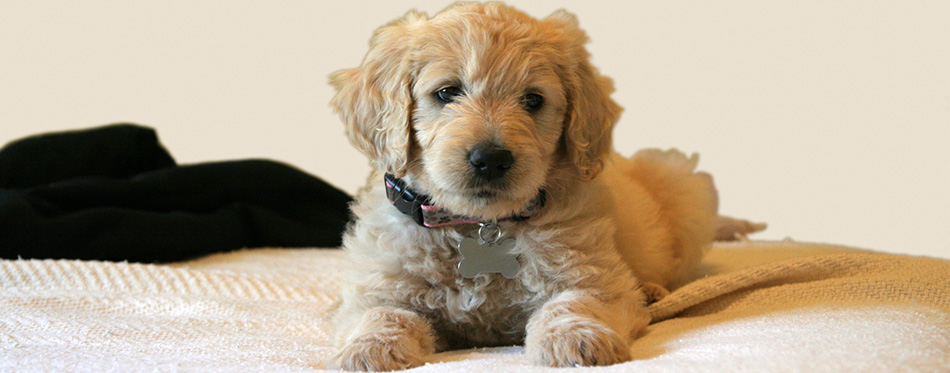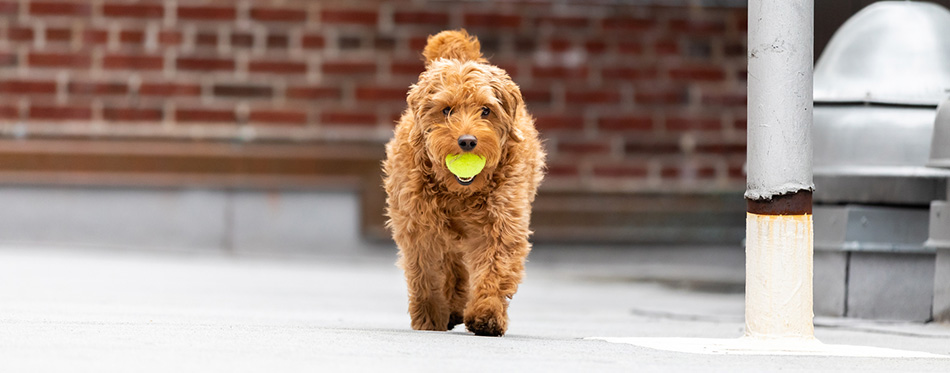With the cute looks of a shaggy teddy bear and an adorable personality that will totally capture your heart, what’s not to love about the Goldendoodle. One of the popular hybrid or designer breeds, the Goldendoodle is a combination of a Golden Retriever and a Poodle and has all their personality and intelligence in spades.
Regularly cited as one of the top ten most popular dog breeds in the US, there is something pretty special about the Goldendoodle and they make wonderful family pets. They do need space, company, and attention but for your love and time, you will totally get the heart of this loving, friendly dog. We take a look at the Goldendoodle and explore just why they make such wonderful, cheeky and fun family pets.

History of the Goldendoodle
One of the new hybrid breeds on the block, the exact date, and origin of the first Goldendoodles is not known, although they started to be sold in the US around 1992. It is thought the first Goldendoodle was bred from a Poodle and a Golden Retriever in the early 1960s as an attempt to create a family-friendly dog that had a non-shedding coat which could be owned by people with allergies. Hot on the heels of the popularity of the Labradoodle and the Cockapoo, the Goldendoodle quickly became a desirable breed, and is now one of the most popular dog breeds in the US. When it comes to the Labradoodle vs Goldendoodle, both breeds are friendly and make great family pets, although, with its Golden Retriever heritage, the Goldendoodle is known to be more sociable and energetic.
Also known as a Groodle or Doodle, the Goldendoodle is not a pure breed but is considered a designer breed because each of the original parents were purebred. However, as a cross breed, the Goldendoodle is not recognized by the American Kennel Club but they are recognized by both the Continental Kennel Club and the Goldendoodle Association of North America.
Quick Facts About the Goldendoodle
Not only is the Goldendoodle a very pretty dog, but their personality and living nature is enough to make the hardest heart melt. We’ve put together the lowdown on the best Goldendoodle facts to help you decide whether this golden pooch is for you:
- They make great first pets – with their clever but kind personality and a desire to please, the Goldendoodle make the deal first dog, especially for families or more unsure and inexperienced pet owners. These golden wonders love to be part of a family and relish the company of their human pack but beware as the downside is that they don’t like to be left alone and can become destructive or show signs of separation anxiety is left on their own for longer periods of time.
- Not all Goldendoodles are ‘non-shedders’ – despite some of the PR about this breed that they don’t shed their coat, it is impossible to guarantee that all Goldendoodles will fit the mold when it comes to the title of a ‘hypoallergenic dog’. While most Goldendoodles will shed less than other dogs and so can be a good choice if you have a pet fur allergy, the nature of the cross breed means you cannot be sure which of the parent breeds are the most dominant when choosing your new Goldendoodle pup. All dogs also still have dander (dead skin cells) which can trigger an allergic reaction.
- They come with a variety of coats – goldendoodles can come in a range of coats, determined by the dominant genes in their parent breeds. The three main coat styles are loose and wavy, which gives a shaggy appearance; short and tight curls, thanks to a dominant Poodle gene; and straight and flat, for a sleek and silky rather than fluffy teddy bear look. You also get a fantastic color choice when it comes to the Goldendoodle coat, from blonde, silver, and white, through to apricot, red, black, chocolate and, of course, gold.
- …and in a range of sizes – originally bred to be a larger alternative to the extremely popular Cockapoo, the Goldendoodle now comes in a choice of three sizes: standard, medium and miniature Goldendoodles. At their smallest, the mini Goldendoodle will stand around 13 inches high (to the shoulder) and weigh around 15-30 pounds, while the standard bred will be up to 24 inches high and can weigh between 45-90 pounds. Whichever size you choose, the overall look of the Goldendoodle is well-balanced and athletic, with nice lean muscle.
- They don’t make very good watchdogs – goldendoodles love people, even the ones they don’t know and as they are not the most vocal of canines, are unlikely to bark when a stranger approaches, so won’t make the best watchdog for the home. That said, they are a good pet for a busy household with lots of people and they are also very versatile due to their energy and intelligence. Goldendoodles have been known to make excellent service and support dogs, as well as therapy and guide dogs and are pretty adept at agility sports too.
- Goldendoodles love the water! This awesome breed also has an infinity with the water and love to go swimming, whether that’s in a pond, lake, at the beach or in the backyard pool. Just make sure you supervise when they go for a dip (or join them if you’re feeling keen!) and make sure they dry off thoroughly afterwards, especially their ears, to prevent any moisture-related infections.

Things You Should Know
With an average lifespan of between 10 and 15 years, owning a Goldendoodle is a big commitment but one that will give you so much fun, love and joy. However, their popularity means this beautiful breed is not cheap as they can cost anywhere between $1000-$3000. With such a significant time and financial investment, here are the essential things you need to know about welcoming a Goldendoodle into your home.
Health
As the Goldendoodle is a relatively new breed, it is still hard to judge whether it has inherited some or all of the hereditary health issues that affect the Poodle and Golden Retriever parent breeds. The following health conditions are the main ones to look out for when buying a Goldendoodle:
- Gastric torsion or bloat (GDV) – bloat can happen when the stomach is distended with air or gas and then gets twisted and often affects large chested pooches like the Goldendoodle. Unable to belch or vomit, bloat can interrupt the blood flow to the heart and cause a drop in blood pressure, meaning your dog needs urgent medical attention. Signs of bloat include retching, excessive salivation, restlessness or lethargy and a rapid heart rate. Managing the amount of food they eat in one sitting, monitoring the water they drink after eating and not exercising right after eating are all ways of preventing bloat in your Goldendoodle.
- Elbow dysplasia – often found in large puppies that are fast-growing, elbow dysplasia – or abnormal development of the elbow joint – can also be a sign of an underlying condition such as osteochondrosis.
- Epilepsy – both Poodles and Golden Retrievers can be prone to epilepsy, so it is a condition to put on your Goldendoodle watchlist. A lifelong disease, epilepsy can be controlled or alleviated with medication and there are different types of the condition, so it is essential for your vet to diagnose the disease if you suspect it in your pooch. Symptoms include collapsing, loss of consciousness, frenzied whining and paddling motion in the back legs.
- Hip dysplasia – this condition is when the thigh bone doesn’t fit correctly into the hip joint and is an inherited condition, so it is important to check the health records of the breeding dogs before you select from their Goldendoodle puppies.
- Patellar luxation – another skeletal condition, patella luxation happens when the knee joint slips out of place and can cause your Goldendoodle significant pain.
- Von willebrand’s disease – this is a blood clotting disorder where there is not enough of the right clotting factor in a dog’s blood. Signs your Goldendoodle may be suffering from the condition include bleeding gums or unexpected nose bleeds as well as prolonged bleeding from surgery or injury.
- Eye problems – Goldendoodles can be prone to a range of eye conditions, including cataracts, progressive retinal degeneration and corneal dystrophy.
- Ear infections – those gorgeous floppy ears may ramp up your Goldendoodle’s cuteness factor, but they can also cause them problems. With such big ears, moisture can get trapped inside and can lead to ear infections if not cleaned in time.
Training
With their smart brain and a desire to please, Goldendoodles are easy to train and make great pets for first time pet owners. However, this friendly breed is also a little sensitive and doesn’t respond well to harsh or heavy-handed training methods – with the Goldendoodle, positive reinforcement is always the way to go. Their intelligence also means that with a little consistency, your pup will be pretty quick on the uptake when it comes to Goldendoodle potty training. While they are not known for aggression, Goldendoodle pups will need socialization from the get-go to avoid any shyness in your dog and they also need regular contact and attention as they can be prone to separation anxiety if left to their own devices for too long.
One-to-one training also works really well with the attention loving Goldendoodle, with plenty of action and play to keep them focused and away from potentially negative behaviors. They are excellent agility dogs too. By teaching your Goldendoodle the ground rules from the beginning so they recognize who is the alpha dog, you will have a fun, happy and creative pet that knows when to behave and when it really is playtime!

Exercise
Lively and with a relatively low boredom threshold, your gorgeous Goldendoodle will need at least 30 minutes of exercise a day to keep them happy and healthy. They also need plenty of indoor and outdoor space at home to roam and play so don’t always make the best apartment dogs. With their highly trainable attitude and their love of games, make their exercise time more fun and entertaining for you both with plenty of play such as fetch and elements of agility to keep them on their happy toes. And, as water lovers, giving them the chance to swim in the summer will give them more of the exercise and activity variety they crave.
Nutrition
Full-size the Goldendoodle can grow to be quite a big dog and with its energy and activity levels could well have a large appetite. Depending on their size, build and age, a Goldendoodle will need between 2-4 cups of food a day, preferably a high-quality dry kibble, split into two meals a day to create a feeding routine and also to help prevent gastric torsion or ‘bloat’ which is a common condition in the retriever breed.
Always ensure their food is the right quantity for their size and activity level to prevent your dog getting overweight and look for a dry food formula that has all the essential nutrients, including vitamins, minerals, fiber, good fats and protein he needs for mobility, energy and all-round good health.
For more guides on choosing the right dog food, you may wish to check out our reviews of the best dry dog food, organic dog food, grain free dog food, wet dog food and puppy food.
Grooming
While there is no guarantee that your Goldendoodle’s coat will be shedding-free, they are considered to be a light shedder, but they will still need a regular grooming routine. When and how to groom a Goldendoodle will also depend on their coat type, the smoother type coat needs attention two to three times a week, while the more Poodle-dominant thick and curlier fur will need more. Goldendoodles are also good candidates for professional grooming and trimming if you prefer to keep their coat short and neat. Bathing for Goldendoodles should be based on the necessity to avoid him losing too much of the essential oils in his fur.
As with all other dogs, grooming also includes their eyes, ears and nails, which should be checked monthly to ensure they are not getting too long. Check their ears once a week for signs of redness or odor and gently clean the outer ear with a damp cotton wool ball. And don’t forget their oral hygiene by brushing their teeth regularly.
For more help on dog grooming, you may wish to read our guides on the best dog nail grinders, dog dryers, dog clippers, dog paw washers, shampoo for puppy and dog shampoo.

Temperament
Gentle, affectionate and easy-going, with enough energy to ensure dog ownership really is fun, the Goldendoodle has a temperament that makes them ideal family dogs. In short, this golden bundle of fur loves to be with their humans and have a very sociable personality. So much so, that they totally fail as a watchdog as they tend to get on with everyone and usually won’t even bark at someone they don’t recognize! The mix of Poodle and Golden Retriever means you could get more dominant traits from one breed than the other, but both breeds are known for their intelligence and good natures so it shouldn’t be too much of an issue.
The energy and activity levels of a Goldendoodle means they don’t do so well in a confined indoor space such as an apartment as they do need room to move and roam but they also need to be with their humans and can suffer from separation anxiety if left alone for too long. If socialized from a young age, Goldendoodles do well with other dogs and pets and are a good choice for families with younger children although as with all dogs, supervision is required when with very young tots. And with their playful nature, cute looks and generous spirit, your Goldendoodle really will become your little one’s best furry friend.
Source:
- History of the Goldendoodle – Goldendoodle Association of Northern America

